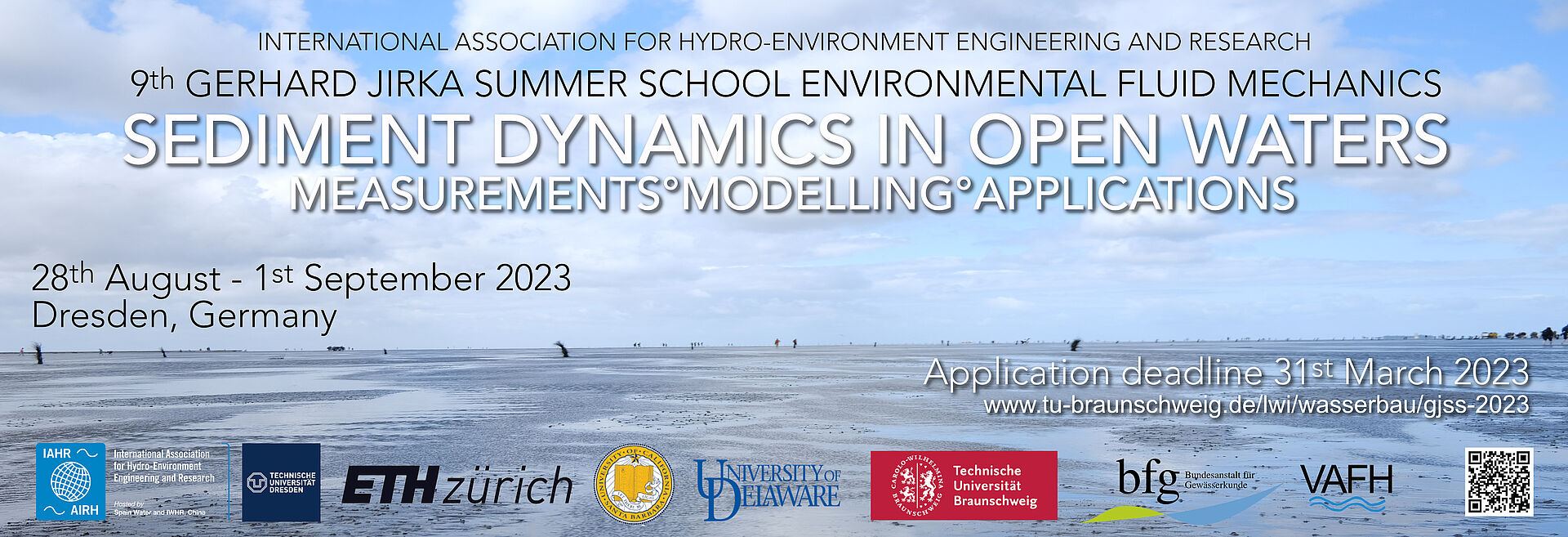
Important dates:
March 31st 2023 - Application deadline, apply now!
April 15th 2023 - Notification of participants:
May 31st 2023 - Early bird registration
August 28th-September 1st 2023 - Gerhard-Jirka Summer School in Dresden, Germany
Environmental fluid mechanics is concerned with the fluid motions and associated mass and heat transport pro-cesses that occur in the earth’s hydrosphere and atmosphere on local or regional scales. A particular emphasis within these scales is the transport of sediments in open waters as the key quantity to shape the morphodynamics of rivers, coasts and entire landscapes. This process also governs the mode, rate and capacity of a fluid flow to transport, mobilize and sequestrate pollutants and nutrients. These fluxes have strong implications for the design of many civil and environmental engineering facilities.
The School is a signature IAHR event that was founded and energized by the late Professor Gerhard Jirka, with a vision to bring together renowned experts and top graduate students from around the world for a unique, interactive learning experience in environmental fluid mechanics. A central objective of the School has always been to combine theory, experiments and applications, with an emphasis on basic theoretical principles (and their mathematical description) as well as consideration of examples of engineering design and environmental applications. This objective is realized in the School through formal, in-class lectures as well as informal, out of class excursions and visits. In the School, the students have plenty of opportunities to present their own research projects and to discuss and seek advice on these projects from Lecturers and fellow students. In this spirit, our event will be the ninth edition of the GJSS. Previous GJSS had been held in Karlsruhe, Germany, 1999; Dundee, Scotland, 2001; Budapest, Hungary, 2004; Karlsruhe, Germany, 2006; Santiago, Chile, 2009; Lucerne, Switzerland, 2012; Hong Kong, China, 2014 and Campo Grande, Brazil, 2018.
The course is intended for upper level or postgraduate students (M.Sc. or Ph.D. candidates); engineers and scientists in industry, government or research institutions involved in environmental engineering, planning or impact prediction.
A prerequisite for attendance is a first degree or diploma in either civil, environmental, mechanical, or chemical engineering, engineering science or an equivalent qualification in a cognate discipline. To apply, please send us a CV and a short motivation letter to gjss-2023(at)tu-braunschweig.de.
The course is open to participants from all countries. Selected scholarships will be awarded for participants from low-income countries if justified.
Dr.-Ing. Bernhard Vowinckel (Course coordinator, LOC), Leichtweiß-Institute for Hydraulic Engineering and Water Resources, TU Braunschweig, Germany; Starting August 1st, 2023: Chair of Transport Processes in Hydrosystems at the Department of Hydrosciences, TU Dresden, Germany
Lectures on: Sediment transport modelling, fine-grained sediment dynamics
Prof. Dr.-Ing. Jochen Aberle (Co-coordinator, LOC), Leichtweiß-Institute for Hydraulic Engineering and Water Resources, TU Braunschweig, Germany
Lectures on: Sediment transport and vegetation-sediment interactions
Prof. Dr. -Ing. Jürgen Stamm (LOC), Institute of Hydraulic Engineering and Technical Hydromechanics, TU Dresden, Germany
Lectures on: Physical modeling in hydraulic engineering
Dr.-Ing. Gudrun Hillebrand, German Federal Institute of Hydrology (BfG), Koblenz, Germany
Lectures on: In-situ measurements and monitoring for sediment balances and management
Dr.-Ing. Katinka Koll, Leichtweiß-Institute for Hydraulic Engineering and Water Resources, TU Braunschweig, Germany
Lectures on: river armoring and hydraulic roughness
Dr.-Ing. Isabella Schalko, Institute of Fluid Dynamics, ETH Zurich
Lectures on: Field observations and physical modeling of flow-sediment and wood in rivers
Prof. Dr. Tian-Jian Hsu, Center for applied coastal research, University of Delaware, USA
Lectures on: Two-phase flow modelling: scour and bedform simulations, effect of flocculation for cohesive sediments, stratified flows
Prof. Dr. Eckart Meiburg, Department of Mechanical Engineering, University of California Santa Barbara, USA
Lectures on: Particle-laden geophysical flows, gravity currents, double diffusion
Dr. Franco Tapia, Department of Hydrosciences, TU Dresden, Germany
Applications of: Rheology of dense suspensions
Dr.-Ing. Ulf Helbig, Institute of Hydraulic Engineering and Technical Hydromechanics, TU Dresden, Germany
Applications of: Physcial models